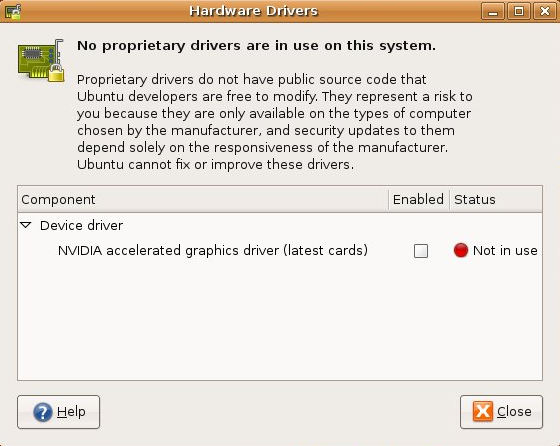
- #Hardware drivers for ubuntu install
- #Hardware drivers for ubuntu drivers
- #Hardware drivers for ubuntu driver
- #Hardware drivers for ubuntu free
- #Hardware drivers for ubuntu windows
The application allows through a tabbed clear interface to display information about the system hardware, this utility displays significant amount of system details.
#Hardware drivers for ubuntu free
I-Nex is free system info tool which is used to gather information on the main system components (devices) such as CPU, motherboard, memory, video memory, sound, USB devices and so on. This command produces output in plain text that can be copy/pasted into a question or answer here without needing to upload an image. Neofetch is available in the Universe repository since 18.04.Ī convenient way to present neofetch data is to use neofetch -stdout.
#Hardware drivers for ubuntu install
Then install: sudo apt update & sudo apt install neofetch To install you need to add the PPA first: sudo add-apt-repository ppa:dawidd0811/neofetch NeoFetch is a nice command line solution for high level information (if running Ubuntu 14.04 or higher). Using lsmod you can find out which modules are currently loaded.
#Hardware drivers for ubuntu drivers
Drivers generally are kernel modules which you can enable (add) and disable (remove) using the modprobe command. I don't know of any one-in-all solution to dis/enable hardware or drivers. With the - option you can get detailed information about a selected hardware type only, which is quite handy sometimes. Here the -short flag will give you a nice hardware category sorted list. It does also present the components in a very detailed fashion. You can make it output the information in several ways. To get a shorter list representation you can use the -short flag. It will present a very detailed list of pretty much every component. You'll have to run it as super user (sudo). Lshw which should be installed by default.

For further information on any of the programs please consult their man pages. I will post all the possibilities I know. There are several ways to gather hardware information. It even has options to output a nice report that you can send to somebody (though it can easily be too much information).
#Hardware drivers for ubuntu windows
I think the developers aim to make it a replacement for Sandra (a popular Windows hardware information gathering tool). It also provides some simple benchmarking. I don't know that it has a menu location by default.īut it can give you slightly more information (boots, available kernels, etc) than the other options, as well as giving you similar lists of PCI and USB hardware like the first two commands. You then just run it from the same terminal with hardinfo. You'll need to install it first: sudo apt-get install hardinfo

If you want something graphical, I suggest you look at hardinfo. If you just wanted to see your network devices, for example, run this: sudo lshw -c network You often only need info on a small subset of your hardware and lshw will let you select a category. Of course this is usually a lot of information. It gives you so much information, I suggest you pipe it through less or output it to a file and open that in something you can move around in: sudo lshw | less Sudo lshw will give you a very comprehensive list of hardware and settings. Good if you want to know what's plugged in.

Similar functionality with similar verbosity options. AR242x / AR542x Wireless Network Adapter (PCI-Express) (rev 01) Subsystem: Acer Incorporated Device Ġ5:00.0 Ethernet controller : Atheros Communications Inc. Memory at f0944000 (64-bit, non-prefetchable) Ġ0:0a.0 Ethernet controller : NVIDIA Corporation MCP79 Ethernet (rev b1) FCH Azalia Controller (rev 02)įlags: bus master, slow devsel, latency 32, IRQ 35 Memory at f0940000 (64-bit, non-prefetchable) Ġ0:14.2 Audio device: Advanced Micro Devices, Inc. Subsystem: Acer Incorporated Device 080dįlags: bus master, fast devsel, latency 0, IRQ 34 Here are three real world examples: Graphics: $ lspci -nnk | grep VGA -A1Ġ3:00.0 VGA compatible controller : NVIDIA Corporation GF110 (rev a1)Ġ0:01.1 Audio device: Advanced Micro Devices, Inc. It doesn't show USB hardware other than the USB busses. I often ask people to post the output of it here when trying to identify their wireless hardware.

nn will let you simply know the hardware ID which is great for searching.īut it is only a very simple, quick way of getting a list of hardware.
#Hardware drivers for ubuntu driver
The -k argument is a good way to find out which kernel driver a piece of hardware is using. It has varying levels of verbosity so you can get more information out of it with -v and -vv flags if you want it. Lspci will show you most of your hardware in a nice quick way.


 0 kommentar(er)
0 kommentar(er)
